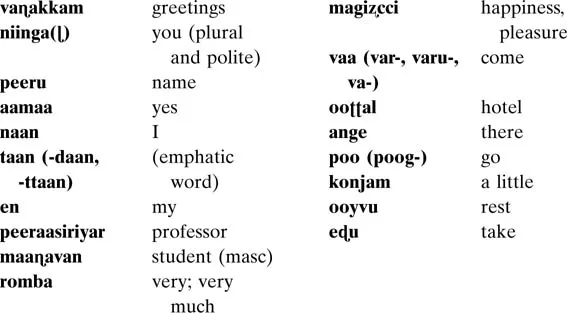
Colloquial Tamil
The Complete Course for Beginners
E. Annamalai, R.E. Asher
- 313 pages
- English
- ePUB (adapté aux mobiles)
- Disponible sur iOS et Android
Colloquial Tamil
The Complete Course for Beginners
E. Annamalai, R.E. Asher
À propos de ce livre
Colloquial Tamil is easy to use and completely up to date!
Specially written by experienced teachers for self-study or class use, the course offers a step-by-step approach to spoken Tamil. While emphasis is placed on colloquial spoken Tamil, you are given a useful introduction to formal speech and the written language as well.
What makes Colloquial Tamil your best choice in personal language learning?
-
- Emphasis on authentic conversational language
-
- Clear explanations on how to pronounce and write the language
-
- Helpful grammar notes and reference grammar
-
- Comprehensive vocabulary lists (Tamil-English and English-Tamil)
-
- Lively illustrations and fascinating cultural insights throughout
By the end of this rewarding course, you will be able to communicate confidently and effectively in Tamil in a broad range of everyday situations.
Audio material to accompany the course is available to download free in MP3 format from www.routledge.com/cw/colloquials. Recorded by native speakers, the audio material features the dialogues and texts from the book and will help develop your listening and pronunciation skills.
Foire aux questions
Informations
• | use simple greetings |
• | introduce yourself |
• | use personal pronouns |
• | use verb forms that are appropriate to the different pronouns |
• | ask questions |
• | make requests |
• | express politeness |


MURUGAN: | vanakkam. niinga Robert Smith-aa? |
SMITH: | aamaa. naandaan Robert Smith. vanakkam. |
MURUGAN: | en peeru Murugan. peeraasiriyar Madivaananoota maanavan. |
SMITH: | romba magizcci. |
MURUGAN: | vaanga, oottalukku poovoom. ange konjam ooyvu edunga. |
SMITH: | sari. vaanga, poovoom. |
MURUGAN: | Greetings. Are you Robert Smith? |
SMITH: | Yes. I am Robert Smith. Greetings. |
MURUGAN: | My name is Murugan. Professor Madhivanan’s student. |
SMITH: | Pleased to meet you. (lit. Much pleasure) |
MURUGAN: | Come. Let’s go to the hotel. You can rest up a bit. (lit. Take some rest there) |
SMITH: | Fine. Come, let’s go. |

1 | The intonation rises slightly at the end of the sentence when it is a question. |
2 | g between vowels is commonly pronounced h. |
3 | Vowels i and e in the beginning of a word are pronounced with a preceding y tinge (e.g. yedu). Vowels u and o in the beginning |
of a word have a w tinge (e.g. wonga). | |
4 | In a few phrases, n at the end of a word, when followed by a word beginning with p, is pronounced as m; e.g. en peeru is normally pronounced as em peeru (or even embeeru). |
5 | The word final u is not pronounced when followed by a vowel. |
